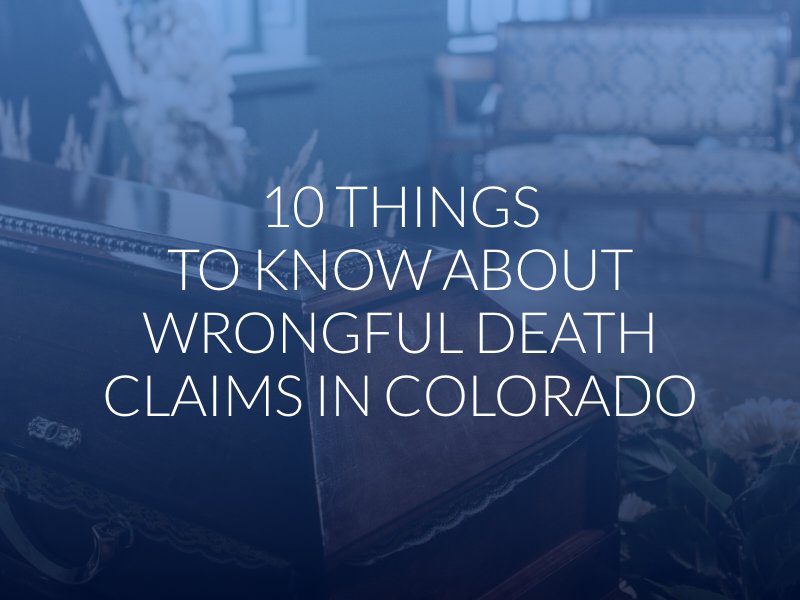Wrongful death claims are a specific type of personal injury claim you can bring in Colorado. These types of cases are high-stakes cases because the losses can be substantial when someone passes away.
There’s a lot people don’t know about wrongful death claims, and if someone you love was killed, the best way to get insight and support through this process is to reach out to a Denver wrongful death lawyer at Dan Caplis Law. You can also read on to learn 10 key things you should know about wrongful death cases so you can better understand what to expect as your claim moves through the legal system.
If you loss a loved one due to another’s negligence, contact us to discuss your legal options today.

1. You can bring a Denver wrongful death claim if your loved one would have had a personal injury claim
Colorado Revised Statutes section § 13-21-202 establishes the right to pursue a wrongful death claim if the victim would have been able to make a personal injury claim had their injuries not been fatal.
This law is an important one, because negligent or careless individuals who cause harm to others should not escape liability for the harm they cause because they happen to kill, rather than just injure, their victims.
2. Wrongful death cases in Denver are separate from survival actions
Wrongful death claims give close family members of a deceased victim the right to pursue a case to recover for their losses caused by the death, including loss of wages they would have had coming into their household if it wasn’t for the untimely death, as well as loss of companionship.
Survival actions are a separate cause of action that allows the estate of the deceased to pursue a claim for the damages the victim experienced before passing away from the injuries, such as medical bills and lost wages.
3. Denver wrongful death claims are civil claims
When you pursue a lawsuit for wrongful death, the case is a civil court case and not a criminal court case. This means that the defendant doesn’t go to jail if the plaintiff wins. The goal of a civil case is to allow loved ones to bring claims against those who have harmed them. In this case, those who were left behind seek compensation for the untimely death of their loved one.
4. You have the burden to prove wrongful death
When you make a wrongful death claim, you have a legal obligation to prove your case in order to get compensation. You can do this by showing that the defendant breached a legal duty to act with reasonable care.
You can prevail in your case if you can show they were unreasonably negligent, violated safety rules, acted wrongfully on purpose, or fall under strict liability laws that make people and companies automatically liable for certain behaviors, such as releasing a defective product that causes harm.
You’ll also have to show that the defendant’s actions were the cause of the death and resulting damages.
5. The burden of proof is lower than in a criminal case
In a criminal case, a prosecutor can get a conviction only if they can prove a defendant was guilty beyond a reasonable doubt. In a Denver wrongful death claim, you must prove your case by a preponderance of the evidence instead. This is a lesser burden, and it means you must show that more likely than not, the defendant was liable for your losses.
6. Only certain people can file a Denver wrongful death claim
Under Colorado law, the spouse of the deceased has the right to file a wrongful death claim in the first year after the death.
If the spouse chooses, the spouse can also give permission for heirs to file. If there is no spouse, a personal representative can file, as can the parents or siblings of unmarried adults or children who do not have dependents of their own.
In the second year after the death, the spouse, children, or beneficiary may file, or parents and siblings if the victim was unmarried and without kids.
7. You have only a limited time to file your Denver wrongful death claim
You typically have two years from the time of the death to file a wrongful death claim, although you can take up to four years to pursue a wrongful death case arising from a hit and run. If you wait too long, your case will be time-barred because the statute of limitations will have expired.
8. You may be able to pursue a claim against multiple defendants
You can obviously bring a wrongful death action against the person or company that directly caused the death.
However, you may be able to pursue a case against multiple defendants. For example, if a truck driver caused a crash while performing his job, vicarious liability rules may also entitle you to sue the trucking company as well.
9. You have the right to be “made whole” after a wrongful death claim in Denver
You should be compensated for all economic and financial losses, including:
- Medical bills
- Lost Wages
- Pain and suffering
- Emotional distress
- Lost companionship
- Funeral expenses
- Exemplary damages or punitive damages in limited cases when the defendant acted with fraud or malice and engaged in willful misconduct
10. You can get legal representation on a contingent fee basis
You do not have to pay for the services of a Colorado wrongful death lawyer unless you win your case. Dan Caplis Law offers free consultations and will represent you on a contingent fee basis throughout your case, which means we only get paid if we recover money for you.
Give us a call today at (303) 770-5551 to learn more about wrongful death cases and about how we can help you get the money you deserve.




